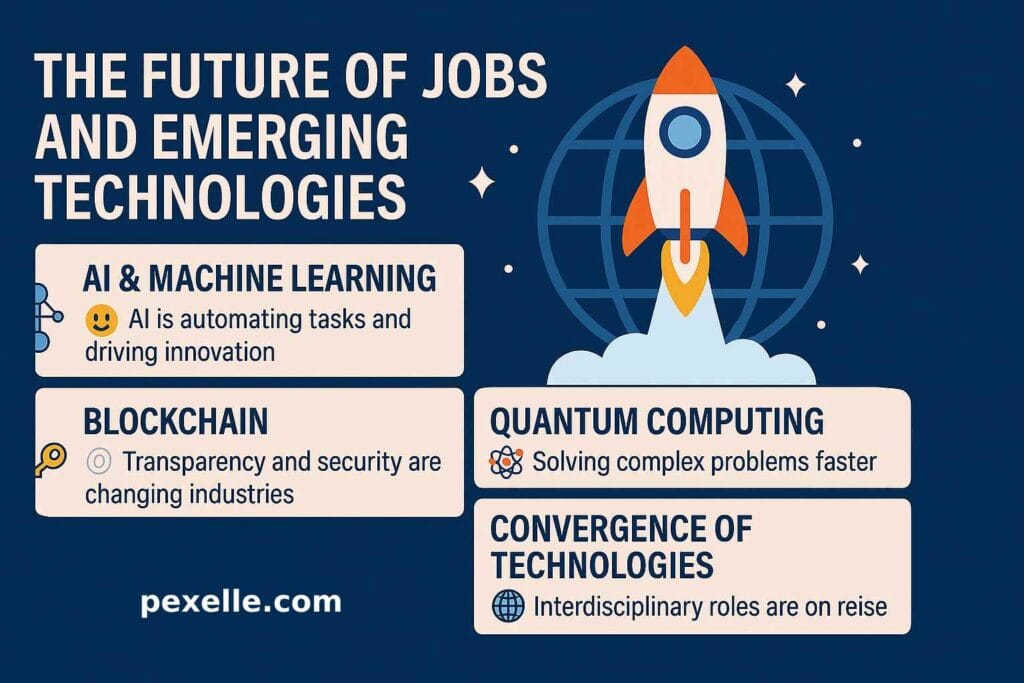The Transformation of Future Jobs with the Impact of Emerging Technologies: From Artificial Intelligence to Blockchain and Quantum Internet

The rapid advancement of technology has always played a central role in shaping industries and job markets. In recent years, emerging technologies such as Artificial Intelligence (AI), blockchain, and quantum computing have begun to disrupt traditional industries, giving rise to new job roles and altering the skills required in the workforce. The future of work is being reshaped by these technologies, which are not only enhancing productivity and efficiency but also creating entirely new fields of employment. This article explores the transformation of future jobs and how these cutting-edge technologies are playing a key role in that change.
1. Artificial Intelligence (AI) and Machine Learning: Revolutionizing Job Roles
Artificial Intelligence (AI) is undoubtedly one of the most transformative forces in the job market today. AI encompasses technologies such as machine learning, natural language processing, and robotics, which are increasingly integrated into various industries. AI is automating repetitive tasks, analyzing vast amounts of data, and making decision-making processes faster and more accurate.
As a result, several industries are witnessing the emergence of new job roles. In particular, positions such as AI specialists, machine learning engineers, data scientists, and AI ethicists are seeing a surge in demand. These professionals are responsible for designing, developing, and implementing AI models and systems that can solve complex problems. Additionally, AI-driven tools are also empowering workers in fields like healthcare, finance, and customer service, enhancing their ability to perform tasks with greater precision.
The rise of AI is also contributing to the growing demand for interdisciplinary skills. Workers will need to combine technical expertise with knowledge in fields such as business, law, and ethics to ensure that AI systems are used responsibly and efficiently.
2. Blockchain Technology: Redefining Trust and Decentralized Roles
Blockchain technology, originally designed to support cryptocurrencies like Bitcoin, is now poised to transform industries far beyond finance. Blockchain offers a decentralized, transparent, and immutable way to record transactions, which has significant implications for various sectors, from supply chain management to healthcare and beyond.
The increasing adoption of blockchain is generating demand for new job roles such as blockchain developers, blockchain architects, smart contract developers, and decentralized finance (DeFi) specialists. These professionals design and implement blockchain-based solutions, ensuring that transactions are secure, transparent, and efficient.
Moreover, the rise of decentralized applications (dApps) and blockchain-based smart contracts is leading to the creation of new economic models. As businesses explore the potential of blockchain to streamline processes and enhance security, the need for blockchain consultants and strategists who can advise organizations on how to implement blockchain solutions will continue to grow.
The transformation brought by blockchain is not just technological but also philosophical, challenging traditional concepts of trust, governance, and privacy. In the future, jobs may increasingly revolve around managing decentralized systems and ensuring they operate effectively.
3. Quantum Computing: Unlocking New Frontiers of Problem-Solving
Quantum computing, though still in its early stages, holds the potential to revolutionize industries that require immense computational power. Unlike classical computers, which process information in binary form (0s and 1s), quantum computers utilize qubits that can exist in multiple states simultaneously, enabling them to solve complex problems much faster.
Industries such as cryptography, drug discovery, finance, and materials science stand to benefit greatly from quantum computing. However, the field is still in its infancy, and significant breakthroughs are required before quantum computers become widely accessible. As a result, the demand for quantum computing professionals is set to rise. Roles such as quantum software developers, quantum algorithm researchers, and quantum hardware engineers will be crucial in advancing this technology.
In the future, as quantum computers become more powerful and accessible, the need for individuals skilled in quantum information science, quantum cryptography, and quantum machine learning will become more prominent. Quantum computing will not only unlock new business opportunities but also pose new challenges related to data security and computational efficiency.
4. The Convergence of Emerging Technologies: Creating New Interdisciplinary Roles
As AI, blockchain, and quantum computing continue to evolve, their convergence will create a new wave of interdisciplinary job roles. Professionals who understand the interplay between these technologies will be at the forefront of future innovations. For instance, blockchain and AI can be combined to create decentralized AI systems that operate autonomously and transparently, while quantum computing could be used to enhance AI algorithms and blockchain encryption methods.
Emerging roles such as AI blockchain developers, quantum AI researchers, and blockchain cryptographers will become increasingly important as organizations look to harness the full potential of these technologies. These professionals will need to have a deep understanding of multiple domains, including computer science, mathematics, and physics, as well as the ability to innovate at the intersection of these fields.
Furthermore, as technology continues to shape the future of work, it will be essential for workers to engage in lifelong learning to stay competitive. The demand for specialized knowledge in emerging technologies will require continuous professional development, leading to the rise of new educational and training programs focused on skills such as quantum computing, AI, and blockchain.
5. Conclusion: Adapting to the Technological Revolution
The future of jobs is being reshaped by the ongoing technological revolution driven by AI, blockchain, and quantum computing. These emerging technologies are not only creating new job roles but also transforming the way we work, enhancing productivity, and offering solutions to some of the world’s most pressing challenges. As we move forward, workers will need to adapt by acquiring new skills and embracing interdisciplinary knowledge to thrive in this rapidly evolving landscape.
Ultimately, the transformation of future jobs will depend on how well individuals and organizations can navigate these technological advancements and harness their potential to create more efficient, secure, and innovative work environments. By doing so, the workforce will be better equipped to tackle the opportunities and challenges that the future holds.
Source : Medium.com




